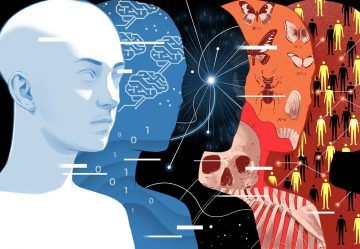Nathaniel Comfort in Nature:
 In the iconic frontispiece to Thomas Henry Huxley’s Evidence as to Man’s Place in Nature (1863), primate skeletons march across the page and, presumably, into the future: “Gibbon, Orang, Chimpanzee, Gorilla, Man.” Fresh evidence from anatomy and palaeontology had made humans’ place on the scala naturae scientifically irrefutable. We were unequivocally with the animals — albeit at the head of the line. Nicolaus Copernicus had displaced us from the centre of the Universe; now Charles Darwin had displaced us from the centre of the living world. Regardless of how one took this demotion (Huxley wasn’t troubled; Darwin was), there was no doubting Huxley’s larger message: science alone can answer what he called the ‘question of questions’: “Man’s place in nature and his relations to the Universe of things.”
In the iconic frontispiece to Thomas Henry Huxley’s Evidence as to Man’s Place in Nature (1863), primate skeletons march across the page and, presumably, into the future: “Gibbon, Orang, Chimpanzee, Gorilla, Man.” Fresh evidence from anatomy and palaeontology had made humans’ place on the scala naturae scientifically irrefutable. We were unequivocally with the animals — albeit at the head of the line. Nicolaus Copernicus had displaced us from the centre of the Universe; now Charles Darwin had displaced us from the centre of the living world. Regardless of how one took this demotion (Huxley wasn’t troubled; Darwin was), there was no doubting Huxley’s larger message: science alone can answer what he called the ‘question of questions’: “Man’s place in nature and his relations to the Universe of things.”
Huxley’s question had a prominent place in the early issues of Nature magazine. Witty and provocative, ‘Darwin’s bulldog’ was among the most in-demand essayists of the day. Norman Lockyer, the magazine’s founding editor, scored a coup when he persuaded his friend to become a regular contributor. And Huxley knew a soapbox when he saw one. He hopped up and used Nature’s pages to make his case for Darwinism and the public utility of science. It was in the seventh issue — 16 December 1869 — that Huxley advanced a scheme for what he called ‘practical Darwinism’ and we call eugenics. Convinced that continued dominance of the British Empire would depend on the “energetic enterprising” English character, he mused about selecting for a can-do attitude among Britons1. Acknowledging that the law, not to mention ethics, might get in the way, he nevertheless wrote: “it may be possible, indirectly, to influence the character and prosperity of our descendants.” Francis Galton — Darwin’s cousin and an outer planet of Huxley’s solar system — was already writing about similar ideas and would come to be known as the father of eugenics. When this magazine appeared, then, the idea of ‘improving’ human heredity was on many people’s minds — not least as a potent tool of empire.
More here.
